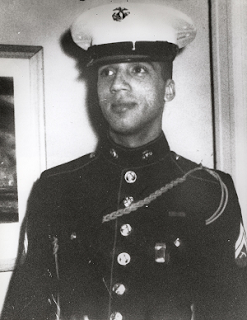Dragon Award Finalist, Best Mil SF: Ghost Marines - Integration
This blog post reminds us of the life and sacrifices made by Sgt. Rodney M. Davis, USMC. He graduated from a segregated public school system in 1961, and joined an integrated Marine Corps. On September 6, 1967, at the age of 25, Sgt Davis gave his life that his fellow Marines could live.
When his body was returned to his family in his home town of Macon, GA, it could not legally be buried within the city limits. More than forty years later, his burial site was rescued from obscurity, thanks to his fellow Marines, and by other concerned citizens.
I am honored to say I come from the same home town as Sgt. Davis.
For those without ad blockers, a picture link:
When his body was returned to his family in his home town of Macon, GA, it could not legally be buried within the city limits. More than forty years later, his burial site was rescued from obscurity, thanks to his fellow Marines, and by other concerned citizens.
I am honored to say I come from the same home town as Sgt. Davis.
For those without ad blockers, a picture link:
And for those of you WITH ad blockers, a text link: Ghost Marines: Integration
Preliminaries. This is the 14th book I have reviewed in the series for the 2018 Dragon Awards. This is only the THIRD military science fiction novel I have reviewed, which speaks of great restraint on my part, as mil sci-fi is by far my chosen diet of reading material.
As straight-up military science fiction, it works, it works, it works! However, the author has chosen to have this work ALSO reflect a somewhat-ignored crisis point for Americans: the integration of blacks into all aspects of the military. He writes from the perspective of the Marine Corps, which is fitting, as he is a retired Marine officer. I was US Army enlisted, and I came along after the very worst resistance was over. There was plenty of hassle to go around, but I refer to the FORMAL resistance. The last person to hold the position of Secretary of War was forced to resign due to his refusal to cooperate with the orders to integrate all aspects of the services. As a trainee in 1972, I had some long-service instructors who had been in the Army since the earliest transitions, and one fine afternoon in a rage at some verbal example of trainee stupidity, an old black sergeant told us that in the old days, if a man called you by any name other than what was printed on your name tag, you just pick up your gun and shot him. The consequence: they fined you a dollar to pay for the cartridge, bought you a pack of cigarettes, and shipped you to another post. (I have since heard that procedure applied to a guard who shot a prisoner, but this was my first contact with the story.)
A review. Away off on some dusty backwater planet, young Leefe is beside himself with excitement, because his cousin is entering his coming-of-age ceremony. From context, we discover that these are not humans, and that the animal his cousin is facing is not a lion, and that there exists some tension between the dominant humans on the planet and Leefe's people. His cousin successfully fights off the deadly beast, and Leefe looks forward to his turn in some years later. That day is followed by the celebration of the preparation of the spices, and the entire village is geared up for the feast. In the midst of preparations, however, a human airship descends. To their horror, Leefe and the rest of the tribe discover they are slavers. The slavers quickly wipe out the elders, and begin paralyzing and binding the young, in preparation to loading them into the ship for transport. When all is lost, the Imperial Marines arrive, and make short work of the slavers, freeing Leefe and the other survivors.
A period of years later, Leefe and his friends have arrived at a Imperial Marine Corps recruiting station. He wishes to pay them back, and to become a warrior as well.
However, the prospective recruits are warned by a very senior elder that they must always be on their guard, because there is much resistance to them being joined to the Imperial Marines. Much of it, he doesn't understand; however, he does understand when he is treated with contempt, by those at the recruiting station, and later, by his training officers.
Situations worsen when the small group of wyntonsn trainees are blended in with humans. Intended to keep Lief (his new, official name) and his people from suffering from discrimination, it has the effect of closing them off from self-support.
We follow Lief and his companions through training, and see them encounter some often dramatic examples of bigotry. Other items, such as the lack of anything resembling their native food, are basically ignored as the cost of doing business.
Deployment follows training, and the troops must individually determine the best way to make it forward. Frictions exist beyond the squad bay doors, and those must be addressed as well.
And if I haven't ALREADY tossed too many spoilers at you, then I'm stopping now.
Closing comments. As mentioned earlier, this book WORKS as a straight-up example of well-written mil sci fi. However, it's the recounting of the personal experiences that Leefe Leif had on their way to becoming Marines that is particularly striking to me. As I said, by 1972, when I entered the service, The worst of the institutional forms of racism were gone; that doesn't mean that there weren't still problems! But, I shared days in the army with guys who had been there, even before Truman had signed the first of the executive orders. And as a quiet mouse in a hole, stationed in the office as a runner, I heard some of the old-service guys talk about the old days, and whether they were better; it WASN'T a simple question.
Peace be on your household.



Comments
Post a Comment